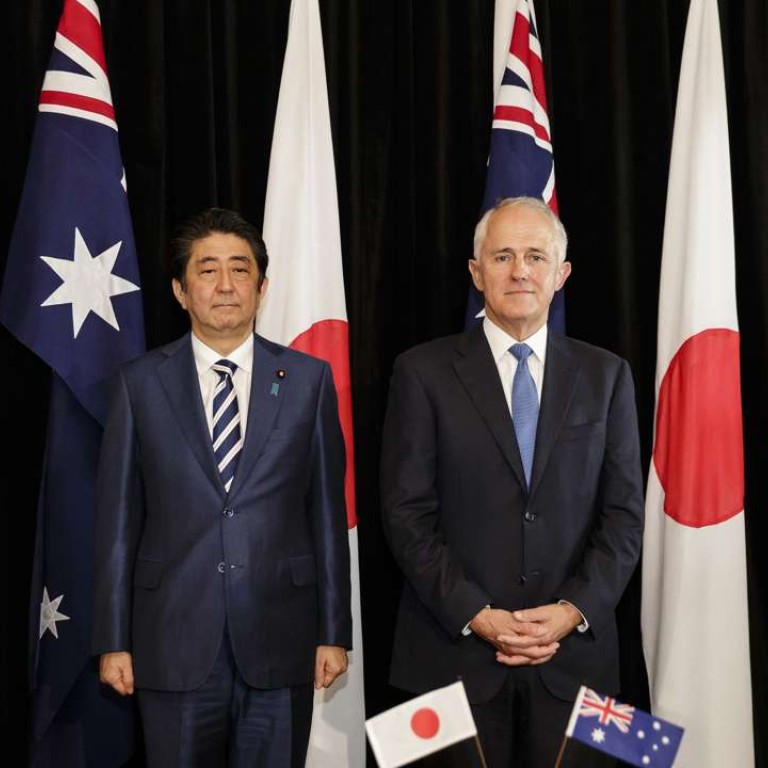
Japanese Prime Minister Shinzo Abe reinforces support for TPP during visit to Australia
Canberra and Tokyo also announced a new defence deal to facilitate closer logistics support and cooperation during combined exercises, training and peacekeeping operations
Japan and Australia reiterated support for the Trans-Pacific Partnership, days before US president-elect Donald Trump, who has promised to scrap the trade pact, takes office, and pledged to work together to ensure the free trade deal comes into force.
After talks with Australian Prime Minister Malcolm Turnbull, Prime Minister Shinzo Abe took the lead on the trade pact covering 12 Pacific Rim nations that was ratified by Japan’s parliament last month.
“We agreed that we should demonstrate anew to the world the importance of free trade,” Abe told reporters. We confirmed that we would coordinate for the early entry into force of the TPP.”
The two men later released a joint statement which “stressed that implementing the TPP remains an indispensable priority because of the significant economic and strategic benefits it offers”.
Turnbull noted, “For both of our nations the United States remains the cornerstone of our strategic and security arrangements.
“We will work closely with the incoming administration, as we have been [doing], to advance the region’s interest and our shared goals.”
He had earlier told NHK television in an interview that Australia would “commend” the TPP to the new administration.

US President Barack Obama championed the deal saying it would enable Washington to set the global trade agenda in the face of China’s increasing economic might.
But Trump has repeatedly shot it down as bad for America and particularly for jobs, casting a dark shadow over its future.
The TPP encompasses some 40 per cent of the global economy and also includes Brunei, Canada, Chile, Malaysia, Mexico, New Zealand, Peru, Singapore and Vietnam.
Unveiled in 2016 and years in the making, the TPP cannot be implemented in its current form without US ratification.
Abe has made it a pillar of his growth platform to revive exports and the world’s number three economy.
Trump says he supports free trade but that existing deals, such as the North American Free Trade Agreement between the US, Canada and Mexico, have not been fairly negotiated and do not serve US interests.

Close allies Canberra and Tokyo announced Saturday a new defence deal to facilitate closer logistics support and cooperation during combined exercises, training and peacekeeping operations.
And they called on their defence ministers “to pursue deeper defence cooperation in 2017, including joint training, exercises, operations and capacity building”.
The leaders said the pact would allow their militaries to provide each other with logistical support during exercises, and are working toward an agreement that would make it easier to participate in joint military exercises.
“The relationship between Australia and Japan is closer, stronger and more constructive than ever,” Turnbull told reporters after meeting Abe.
Following their meeting, Abe said the countries would enhance their coordination on activity in the disputed South China Sea and the nuclear threat posed by North Korea.

“In a situation where there is increasing uncertainty and nebulousness on the political, security and economic scenes, it is important to guard and increase the robustness of the free, open and rules-based international order,” Abe said through an interpreter. “It is more necessary than ever before for Japan and Australia as special strategic partners to play a leading role for regional peace and prosperity.”
They also unveiled an agreement to exchange sporting expertise with Japan due to host the 2019 Rugby World Cup followed by the summer Olympics in 2020.
The prime ministers “condemned in the strongest terms North Korea’s continued nuclear tests and multiple ballistic missile launchers as destabilising and provocative and urged North Korea to desist”.
They also voiced “serious concern” at the South China Sea situation, urging restraint by all parties.
The Japanese leader arrived in Sydney from the Philippines on Friday night and will continue Sunday his trip that will also take in Indonesia and Vietnam.
Additional reporting by Associated Press

.png?itok=arIb17P0)